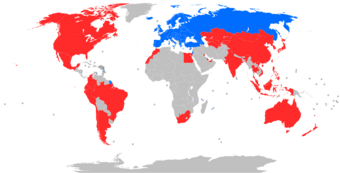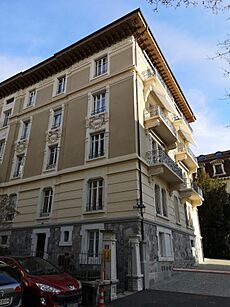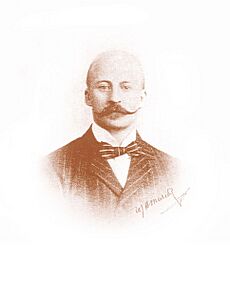International Skating Union facts for kids
The International Skating Union (ISU) is the main organization that manages competitive ice skating sports around the world. These sports include figure skating, synchronized skating, speed skating, and short track speed skating. The ISU was started in July 1892 in Scheveningen, Netherlands. This makes it one of the oldest international sports groups.
The ISU was created to set up fair rules for skating competitions and to organize international events. Today, its main office is in Lausanne, Switzerland.
Contents
History of the ISU
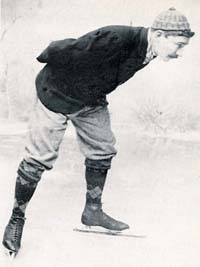
The International Skating Union (ISU) began in 1892 in Scheveningen, a Dutch town by the sea. Fifteen men from different countries and clubs attended the first meeting. The ISU was the first international group to manage winter sports like speed skating and figure skating. It quickly set up rules for both.
In 1895, the ISU decided to focus only on amateur skaters, not professionals. They held their first amateur skating championship in February 1896 in St. Petersburg, Russia.
For a while, the United States and Canada had their own skating organization, the International Skating Union of America (ISUA). But by 1909, many European countries had joined the ISU, and the ISUA eventually closed down in 1927.
Figure skaters from Europe and North America often skated differently. The ISU helped create a standard way of judging figure skating. This made it easier for skaters from all over the world to compete fairly. In 1911, Canada joined the ISU, and the United States Figure Skating Association followed in 1923. Japan also became a member in 1926.
The first major ISU competitions were the World and European Speed Skating and Figure Skating Championships. Both sports were part of the very first Winter Olympic Games in Chamonix in 1924. Ice dancing was added to the Olympics in 1976. After 1945, more countries from Europe, Oceania, and Africa joined the ISU.
The ISU celebrated its 75th anniversary in 1967 and its 100th anniversary in 1991. They couldn't celebrate earlier anniversaries because of the world wars.
New Skating Sports and Rules
In 1967, the ISU started to include short track speed skating. The first official World Championships for this sport happened in 1981. Short track speed skating became an Olympic sport in 1992.
By 1988, 38 countries were part of the ISU. The organization also changed some long-standing rules. For example, they removed mandatory figures from singles figure skating competitions. In the early 1990s, many new countries joined the ISU after the breakup of the Soviet Union and other nations.
In 1994, synchronized skating was officially recognized as its own sport. The first World Synchronized Skating Championships were held in 2000 in Minneapolis, Minnesota.
After the 2002 Winter Olympics in Salt Lake City, the ISU made big changes to its events. They started using video replays to review referee decisions. They also completely changed how figure skating was judged. This happened because there were concerns about the judging system at the 2002 Olympics. A new judging system began in 2005. It replaced the old "perfect score" system with a new one that gives points for different technical moves.
Since the 2000s, more countries from Asia and Latin America have joined the ISU. In 2019, skating groups from Chile, Peru, Turkmenistan, and Vietnam became members.
In 2022, the ISU announced that athletes from Russia and Belarus were not allowed to compete in ISU events. This decision was made due to the conflict in Ukraine. The ISU continues to monitor the situation.
ISU Member Countries
The ISU has 80 member countries, with 102 different skating associations. Some countries have more than one association. These members are divided into five regions:
- Four Continents (non-European countries): 35 Members
- European Countries: 45 Members
| Number | Region | Countries |
|---|---|---|
| Four Continents (4C) | ||
| 1 | Africa | 3 |
| 2 | Asia | 21 |
| 3 | Oceania | 2 |
| 4 | Americas | 9 |
| European | ||
| 5 | Europe | 45 |
| Total | World | 80 |
When Countries Joined
- 2008
|
|
ISU Championships and Events
The ISU organizes many important skating competitions each year. These are called "ISU Championships."
Long Track Speed Skating
|
Figure Skating
|
Short Track Speed Skating
|
Synchronized Skating
|
Veteran Competitions
- World Veterans Figure Skating Championships
- World Veterans Speed Skating Championships
- World Veterans Short Track Speed Skating Championships
Other Major Events
Events like the Olympic Winter Games and the ISU Grand Prix of Figure Skating are not called "ISU Championships." However, the scores from these events still count towards skaters' personal best scores.
ISU Cups and Grand Prix Series
The ISU also organizes series of competitions where skaters earn points throughout a season:
- ISU Speed Skating World Cup (since 1985)
- ISU Short Track Speed Skating World Cup (1998–2024)
- ISU Short Track World Tour (since 2025)
- ISU Grand Prix of Figure Skating (since 1995)
- ISU Junior Grand Prix of Figure Skating (since 1997)
First World Championships by Discipline
Here are the dates and places of the first world championships for different skating sports, organized by the ISU:
- 1893: Speed skating (men only) in Amsterdam
- 1896: Figure skating (men only) in St. Petersburg
- 1906: Figure skating (ladies) in Davos
- 1908: Figure skating (pairs) in St. Petersburg
- 1936: Speed skating (women) in Stockholm
- 1952: Figure skating (ice dance) in Paris
- 1970: Sprint speed skating in West Allis, Wisconsin
- 1978: Short track speed skating in Solihull, UK
- 2000: Synchronized skating in Minneapolis
Figure Skating Medals
In figure skating, there are two types of medals awarded at ISU Championships:
Overall Medals
These medals are given to skaters who achieve the highest overall scores in each event.
Small Medals
Small medals are awarded for the best performances in specific parts of a competition. For example, in single skating, pair skating, and synchronized skating, there are two main parts: the short program and the free skating program.
- Stage 1: Small medals are given for the highest scores in the short program or rhythm dance.
- Stage 2: Small medals are given for the highest scores in the free skating or free dance.
Small medals are only given at ISU Championships like the World, World Junior, European, and Four Continents Figure Skating Championships. They are not awarded at the Olympic Games or the ISU Grand Prix of Figure Skating.
How the ISU is Organized
The ISU is an international sports organization recognized by the International Olympic Committee (IOC). It manages figure skating and speed skating sports globally. These include Speed skating, Single & Pair skating, Ice dance, Short track speed skating, and Synchronized skating.
While national skating groups manage these sports in their own countries, all international matters are handled by the ISU. The ISU has been based in Lausanne, Switzerland, since 1947. Also in 1947, English became the ISU's official language.
The ISU is set up as an association under Swiss law. Its main goals are to manage and promote figure and speed skating. It aims to make these sports more popular, improve their quality, and get more people involved worldwide. The ISU also makes sure that the interests of all its member countries are respected.
The ISU has a set of rules and guidelines that cover everything from its basic structure to detailed technical rules for each sport. These also include rules about ethics and anti-doping.
ISU Members
The members of the ISU are the national skating associations from different countries. These national groups manage figure and speed skating within their own country. As of February 2020, the ISU had 98 members.
ISU Congress
The ISU Congress is the highest decision-making body of the ISU. It is made up of representatives from all the ISU member countries. The Congress meets every two years. Decisions are usually made by a simple majority vote. However, some important proposals need a two-thirds majority to pass.
Since the ISU started in 1892, there have been 59 ordinary Congress meetings.
- 1892 –
 Netherlands, Scheveningen
Netherlands, Scheveningen - 1895 –
 Denmark, Copenhagen
Denmark, Copenhagen - 1897 –
 Sweden, Stockholm
Sweden, Stockholm - 1899 –
 United Kingdom, London
United Kingdom, London - 1901 –
 Deutsches Reich, Berlin
Deutsches Reich, Berlin - 1903 –
 Hungary, Budapest
Hungary, Budapest - 1905 –
 Denmark, Copenhagen
Denmark, Copenhagen - 1907 –
 Sweden, Stockholm
Sweden, Stockholm - 1909 –
 Netherlands, Amsterdam
Netherlands, Amsterdam - 1911 –
 Austria, Vienna
Austria, Vienna - 1913 –
 Hungary, Budapest
Hungary, Budapest - 1921 –
 Netherlands, Amsterdam
Netherlands, Amsterdam - 1923 –
 Denmark, Copenhagen
Denmark, Copenhagen - 1925 –
 Switzerland, Davos
Switzerland, Davos - 1927 –
 France, Bagnères-de-Luchon
France, Bagnères-de-Luchon - 1929 –
 Norway, Oslo
Norway, Oslo - 1931 –
 Austria, Vienna
Austria, Vienna - 1933 –
 Czechoslovakia, Prague
Czechoslovakia, Prague - 1935 –
 Sweden, Stockholm
Sweden, Stockholm - 1937 –
 Switzerland, St.Moritz
Switzerland, St.Moritz - 1939 –
 Netherlands, Amsterdam
Netherlands, Amsterdam - 1947 –
 Norway, Oslo
Norway, Oslo - 1949 –
 France, Paris
France, Paris - 1951 –
 Denmark, Copenhagen
Denmark, Copenhagen - 1953 –
 Italy, Stresa
Italy, Stresa - 1955 –
 Switzerland, Lausanne
Switzerland, Lausanne - 1957 –
 Austria, Salzburg
Austria, Salzburg - 1959 –
 France, Tours
France, Tours - 1961 –
 Norway, Bergen
Norway, Bergen - 1963 –
 Finland, Helsinki
Finland, Helsinki - 1965 –
 Austria, Vienna
Austria, Vienna - 1967 –
 Netherlands, Amsterdam
Netherlands, Amsterdam - 1969 –
 United Kingdom, Maidenhead
United Kingdom, Maidenhead - 1971 –
 Italy, Venice
Italy, Venice - 1973 –
 Denmark, Copenhagen
Denmark, Copenhagen - 1975 –
 West Germany, Munich
West Germany, Munich - 1977 –
 France, Paris
France, Paris - 1980 –
 Switzerland, Davos
Switzerland, Davos - 1982 –
 Norway, Stavanger
Norway, Stavanger - 1984 –
 United States, Colorado Springs
United States, Colorado Springs - 1986 –
 Austria, Velden am Wörther See
Austria, Velden am Wörther See - 1988 –
 Switzerland, Davos
Switzerland, Davos - 1990 –
 New Zealand, Christchurch
New Zealand, Christchurch - 1992 –
 Switzerland, Davos
Switzerland, Davos - 1994 –
 United States, Boston
United States, Boston - 1996 –
 Switzerland, Davos
Switzerland, Davos - 1998 –
 Sweden, Stockholm
Sweden, Stockholm - 2000 –
 Canada, Quebec
Canada, Quebec - 2002 –
 Japan, Kyoto
Japan, Kyoto - 2004 –
 Netherlands, Scheveningen
Netherlands, Scheveningen - 2006 –
 Hungary, Budapest
Hungary, Budapest - 2008 –
 Monaco, Monaco
Monaco, Monaco - 2010 –
 Spain, Barcelona
Spain, Barcelona - 2012 –
 Malaysia, Kuala Lumpur
Malaysia, Kuala Lumpur - 2014 –
 Ireland, Dublin
Ireland, Dublin - 2016 –
 Croatia, Dubrovnik
Croatia, Dubrovnik - 2018 –
 Spain, Seville
Spain, Seville - 2022 –
 Thailand, Phuket
Thailand, Phuket - 2024 –
 United States, Las Vegas
United States, Las Vegas
ISU Council
The ISU Council is the main governing body between Congress meetings. It sets the ISU's policies and strategies. The Council includes the President, two vice presidents (one for figure skating and one for speed skating), and ten other members.
In 1967, Sonia Bianchetti from Italy became the first woman to be a council member. The Council is supported by a Director General and the ISU Secretariat, who handle the daily operations.
Presidents of the ISU
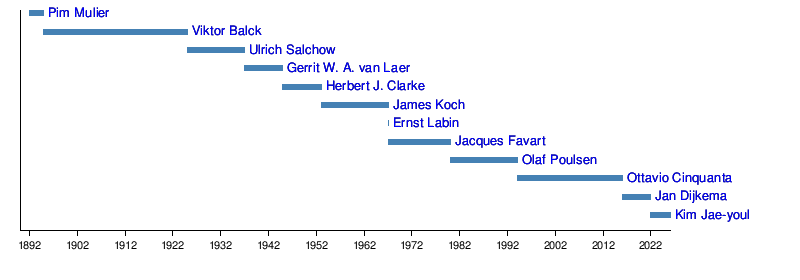
- 1892–1895
 Netherlands, Pim Mulier
Netherlands, Pim Mulier - 1895–1925
 Sweden, Viktor Balck
Sweden, Viktor Balck - 1925–1937
 Sweden, Ulrich Salchow
Sweden, Ulrich Salchow - 1937–1945
 Netherlands, Gerrit W. A. van Laer
Netherlands, Gerrit W. A. van Laer - 1945–1953
 United Kingdom, Herbert J. Clarke
United Kingdom, Herbert J. Clarke - 1953–1967
 Switzerland, James Koch
Switzerland, James Koch - 1967–1967
 Austria, Ernst Labin
Austria, Ernst Labin - 1967–1980
 France, Jacques Favart
France, Jacques Favart - 1980–1994
 Norway, Olaf Poulsen
Norway, Olaf Poulsen - 1994–2016
 Italy, Ottavio Cinquanta
Italy, Ottavio Cinquanta - 2016–2022
 Netherlands, Jan Dijkema
Netherlands, Jan Dijkema - 2022–present
 South Korea, Kim Jae-youl
South Korea, Kim Jae-youl
ISU Commissions and Committees
The ISU has several groups that help it run smoothly:
- ISU Disciplinary Commission: This group handles rule violations.
- ISU Athletes Commission: This group represents the skaters and gives advice to the ISU Council.
- ISU Medical Commission: This group makes sure anti-doping rules are followed.
- ISU Development Commission: This group works on programs to help skating grow.
- ISU Technical Committees: These groups create and update the technical rules for each skating sport.
Rules for Skaters
The ISU sets rules to make sure sports are fair and safe for athletes. These rules also help keep competitions honest.
One important set of rules is about who can compete. In the past, only amateur skaters could go to the Olympics. Over time, these rules changed. Now, the ISU has "eligible" and "ineligible" categories for skaters.
The ISU rules state that skaters can only take part in competitions that the ISU has approved. If skaters compete in events not approved by the ISU, they could face penalties. These penalties can range from a warning to being banned from major international skating events.
For example, a company tried to organize a new speed skating event called the "Icederby Grand Prix." The ISU did not approve this event. They warned skaters that if they participated, they could be banned. Because of this, the Icederby Grand Prix did not happen.
In 2017, the European Commission decided that some of the ISU's rules about who can compete were against fair competition laws. The ISU disagreed but changed its rules temporarily. The ISU also appealed this decision.
ISU Financial Information
The ISU gets its money from a few main sources:
- TV Deals: Partnerships with broadcasters for showing ISU events worldwide.
- Sponsorships: Agreements with companies that want to support ISU events.
- IOC Contributions: Money from the International Olympic Committee for the Winter Olympic Games.
- Investments: Interest earned from the ISU's financial savings.
In 2018, the ISU made about 35.6 million Swiss francs (CHF). A large part of this came from TV rights (around 17 million CHF) and sponsorship deals (around 6.9 million CHF).
Finding new sponsors can be hard because there is a lot of competition. For example, the ISU has not been able to find a new main sponsor for speed skating that pays as much as the old one. Also, when events in China and South Korea were canceled, the ISU lost some sponsorship money from those countries.
The ISU also gets a lot of money from the Olympic Winter Games because its sports are very popular there. The money received after the 2018 Winter Olympics in South Korea was similar to the amount received after the 2010 Winter Olympics in Vancouver.
The ISU also invests its money carefully to make sure it has a steady income.
In 2020, the ISU started the ISU Skating Awards. These awards celebrate top skaters, coaches, and choreographers. Some of the first winners included Yuzuru Hanyu (Most Valuable Skater) and Eteri Tutberidze (Best Coach).
See also
 In Spanish: Unión Internacional de Patinaje sobre Hielo para niños
In Spanish: Unión Internacional de Patinaje sobre Hielo para niños
- International figure skating
- List of international sport federations
- Long track speed skating
- Figure skating
- Short track speed skating
- Synchronized skating
- ISU Figure Skating Championships
Images for kids
 | Emma Amos |
 | Edward Mitchell Bannister |
 | Larry D. Alexander |
 | Ernie Barnes |


